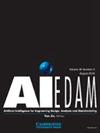An ontology-based fault generation and fault propagation analysis approach for safety-critical computer systems at the design stage
IF 2.3
3区 工程技术
Q3 COMPUTER SCIENCE, ARTIFICIAL INTELLIGENCE
Ai Edam-Artificial Intelligence for Engineering Design Analysis and Manufacturing
Pub Date : 2022-02-03
DOI:10.1017/S0890060421000342
引用次数: 1
Abstract
Abstract Fault propagation analysis is a process used to determine the consequences of faults residing in a computer system. A typical computer system consists of diverse components (e.g., electronic and software components), thus, the faults contained in these components tend to possess diverse characteristics. How to describe and model such diverse faults, and further determine fault propagation through different components are challenging problems to be addressed in the fault propagation analysis. This paper proposes an ontology-based approach, which is an integrated method allowing for the generation, injection, and propagation through inference of diverse faults at an early stage of the design of a computer system. The results generated by the proposed framework can verify system robustness and identify safety and reliability risks with limited design level information. In this paper, we propose an ontological framework and its application to analyze an example safety-critical computer system. The analysis result shows that the proposed framework is capable of inferring fault propagation paths through software and hardware components and is effective in predicting the impact of faults.安全关键计算机系统设计阶段基于本体的故障生成和故障传播分析方法
摘要故障传播分析是一个用于确定计算机系统中故障后果的过程。典型的计算机系统由不同的组件(如电子和软件组件)组成,因此,这些组件中包含的故障往往具有不同的特征。如何描述和建模这种不同的故障,并进一步确定故障通过不同组件的传播,是故障传播分析中需要解决的具有挑战性的问题。本文提出了一种基于本体的方法,这是一种集成方法,允许在计算机系统设计的早期阶段通过推断各种故障来生成、注入和传播。所提出的框架产生的结果可以验证系统的稳健性,并在有限的设计级别信息下识别安全和可靠性风险。在本文中,我们提出了一个本体论框架及其在分析一个安全关键计算机系统实例中的应用。分析结果表明,该框架能够通过软硬件组件推断故障传播路径,并且能够有效地预测故障的影响。
本文章由计算机程序翻译,如有差异,请以英文原文为准。
求助全文
约1分钟内获得全文
求助全文
来源期刊
CiteScore
4.40
自引率
14.30%
发文量
27
审稿时长
>12 weeks
期刊介绍:
The journal publishes original articles about significant AI theory and applications based on the most up-to-date research in all branches and phases of engineering. Suitable topics include: analysis and evaluation; selection; configuration and design; manufacturing and assembly; and concurrent engineering. Specifically, the journal is interested in the use of AI in planning, design, analysis, simulation, qualitative reasoning, spatial reasoning and graphics, manufacturing, assembly, process planning, scheduling, numerical analysis, optimization, distributed systems, multi-agent applications, cooperation, cognitive modeling, learning and creativity. AI EDAM is also interested in original, major applications of state-of-the-art knowledge-based techniques to important engineering problems.

 求助内容:
求助内容: 应助结果提醒方式:
应助结果提醒方式:


